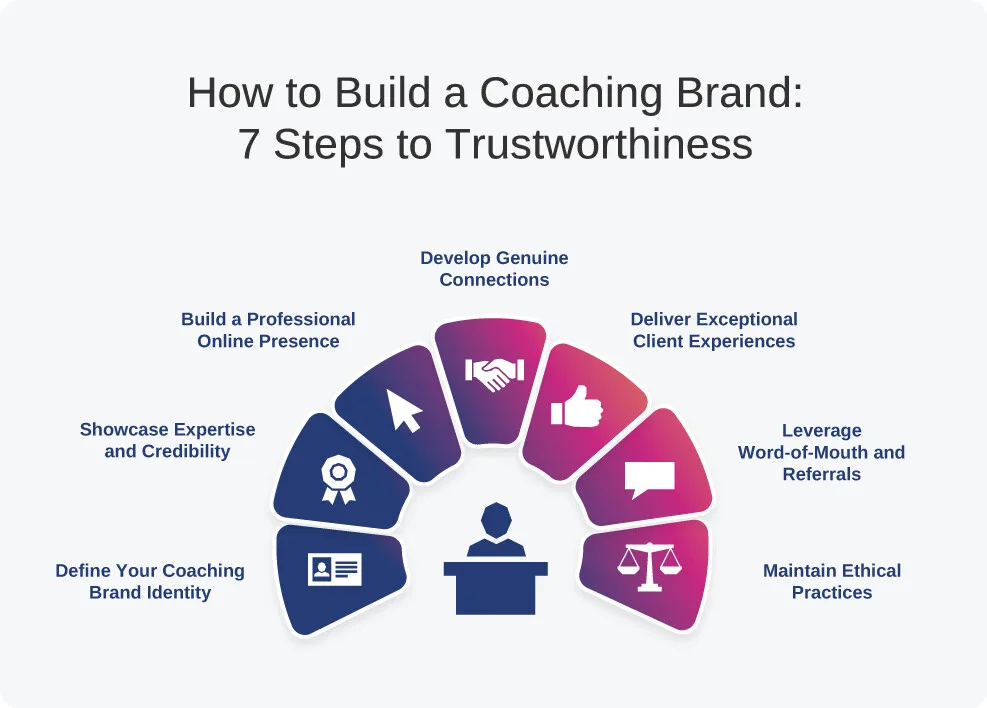When you order a pizza, you gravitate to the brands you trust. You want a flavorful crust, tasty sauce, and fresh toppings that make your taste buds happy. Chances are that the pizza brands you like the most have other qualities that appeal to you as well — qualities like friendlier service, a close location, or great music playing in their dining area. Successful pizza brands work hard to create and maintain a product that’s consistent and helps them stand out in a crowded market.
The coaching field works the same way. It’s more important than ever for professional coaches to distinguish themselves and attract the right clients. Building a strong coaching brand is essential for establishing a reputation as a coach who helps their clients achieve their goals.
Your brand is not your logo — it’s everything about you as a professional. Let’s take a closer look at branding for coaches and what it takes to build an identity that fosters trust and credibility and attracts clients who resonate with your values and expertise.
Why Is Building Trust Crucial for a Coaching Business?
Trust is the foundation of any successful coaching relationship. When clients trust you, they are more likely to be open and honest, leading to deeper insights and more effective coaching outcomes.
Fosters Open Communication
Trust creates a safe space for clients to share their vulnerabilities, challenges, and aspirations openly. They want to believe that you understand them and can provide the support they need. People prefer to work with brands they trust, and open communication establishes a pathway for that to happen.
Encourages Commitment
When clients trust you, they are more likely to commit to the coaching process and follow through on their action plans — eventually leading to progress and sustainable results. A reliable, trustworthy brand tells potential clients that their commitment to you as a coach will pay off.
Builds Long-Term Relationships
Trust is foundational for building long-term relationships with clients. When clients feel understood and supported, they are more likely to continue working with you and refer you to others. As consumers, we want to know that the investment we make with a brand will come with long-term rewards and continue in the future.
Enhances Credibility
Trust enhances your credibility as a coach. When clients see you as trustworthy and reliable, they are more likely to value your expertise and follow your guidance. Bood coaching branding will tell potential clients that you have the qualities, expertise, and experience to lead them where they want to go.
Improves Outcomes
Ultimately, trust leads to better coaching outcomes. When clients trust you, they are more likely to engage fully in the coaching process and follow your advice. Coaches should build a brand that helps clients see the potential of greater self-awareness, personal growth, and achievement of their goals through their practice.
Displays Your Authenticity
Branding coach services requires honest imagery and messaging that conveys the reality of who they are as coaches. A brand should never be a mask that hides your negative qualities; instead, it should be a light that draws attention to your best qualities.
How to Build a Coaching Brand: 7 Steps to Trustworthiness
Branding coaching businesses requires a multifaceted approach — and no small amount of purposeful, consistent effort. If you’re serious about wanting to know how to build a coaching brand, follow these seven key steps below to establish and refine your brand.

1. Define Your Coaching Brand Identity
- Identify your niche. What specific area of coaching do you specialize in? This could be anything from life coaching, business coaching, wellness coaching, or executive coaching.
- Establish core values. What are the fundamental principles that guide your coaching practice? These values should be reflected in all aspects of your coaching brand, from your messaging to your client interactions.
- Create a brand story. Share your journey, experiences, and what drives you to coach others. This helps clients connect with you on a personal level and understand your unique perspective.
- Display what makes you different. What sets you apart from other coaches in your niche? This could be your unique coaching methodology, your specific area of expertise, or your personal approach.
- Outline your unique coaching process and methodology. Clearly articulate your coaching process and how it benefits clients. This helps clients understand what to expect and how you can help them achieve their goals.
- Clarify that YOU are your brand. Your coaching brand is not just a logo or a website; it’s the entire package of who you are as a coach, what you offer, and how you offer it. Your personality, values, and expertise all contribute to your brand identity.
2. Showcase Expertise and Credibility
- Display certifications & credentials. Highlight your professional certifications and credentials, such as those earned from the International Coaching Federation, Co-Active Training Institute, or other industry organizations. You want to openly demonstrate your commitment to professional development and assure clients of your expertise.
- Client testimonials & case studies. Share testimonials and case studies from satisfied clients to showcase the positive impact of your coaching.
- Content marketing. Create valuable content, such as articles, videos, ebooks, or webinars, that demonstrates your knowledge and expertise in your niche. It’s very helpful to establish yourself as a thought leader and build trust with potential clients.
3. Build a Professional Online Presence
- Ensure professionalism and trustworthiness. Your online presence should reflect your professionalism and trustworthiness, including using high-quality images and error-free content.
- Create a professional website. Your website is your online home base. It should be well-designed, easy to navigate, and provide clear information about your services and expertise.
- Create & maintain a social media presence. Use social media platforms to connect with potential clients, share valuable content, and engage in conversations.
- Maintain consistent branding. Use consistent colors, fonts, and messaging across all your online platforms to create a cohesive and recognizable brand identity.
4. Develop Genuine Connections
- Show your personality. Don’t be afraid to let your personality shine through in your online presence and client interactions. A coach is a real person, not a faceless corporation, who connects with clients on a personal, human level.
- Connect with your audience on a human level. Share your own experiences, challenges, and vulnerabilities to build rapport and demonstrate empathy. Clients love learning from stories about their coach’s mistakes.
- Engage with your audience. Respond to comments, emails, and messages promptly. Show people that you value your audience and are committed to providing reliable service.
- Be transparent. Be open and honest about your experience, qualifications, and coaching approach. When clients can trust you, they’re more likely to be open and honest themselves — which leads to better coaching outcomes.
- Offer free value. Provide free resources, such as guides, checklists, or webinars, to establish goodwill and demonstrate your expertise. Generosity is always viewed positively by clients.
- Follow up consistently. Follow up with clients after sessions and track their progress. Actively demonstrate that you care about their success and are invested in their journey.
5. Deliver Exceptional Client Experiences
- Ensure a positive experience for your clients. Strive to create a constructive and supportive coaching experience for every client. Be attentive, responsive, and respectful of their needs and goals.
- Communicate clearly. Share your expectations, coaching structure, and pricing upfront to avoid misunderstandings. You want your clients to be fully informed and not jolted by surprises.
- Personalize your approach. Tailor your coaching programs and methods to meet the unique needs of each client. This way, you prove that you value their individuality and are committed to their success.
- Maintain consistency. Aim to deliver consistent, high-quality coaching that helps clients achieve their desired outcomes. You’ll want to establish a quality-control review process to make sure your clients are regularly experiencing the best you have to offer.
6. Leverage Word-of-Mouth and Referrals
- Collect referrals. Ask satisfied clients for referrals and testimonials.
- Encourage reviews. Encourage clients to share their experiences on online platforms, such as Google Reviews or Yelp.
- Offer referral incentives. Offer discounts or bonuses to clients who refer new business.
- Collaborate with industry experts. Partner with other professionals in your field to cross-promote your services and reach a wider audience. For example, if you’re a health and nutrition coach, you can connect your clients with a fitness expert who can help them create a successful workout routine.
- Display testimonials. Showcase positive testimonials on your website and social media to build credibility and trust with potential clients.
7. Maintain Ethical Practices
- Maintain integrity and ethics. Uphold the highest ethical standards in all your coaching practices and business dealings.
- Maintain confidentiality. Ensure client confidentiality and protect their privacy.
- Follow ethical coaching guidelines. Adhere to the ethical guidelines set forth by professional coaching organizations, such as the International Coach Federation. Prominently display your official credentials with those industry authorities.
- Do honest marketing. Avoid making exaggerated claims or promising unrealistic results. Clients who fall for a “bait-and-switch” approach will completely lose trust in those coaching brands.
- Focus on continued learning & growth. Continuously invest in your professional development and stay updated with the latest coaching practices and research.
Learn How to Build a Coaching Business With Co-Active
Co-Active Training Institute has helped more than 150,000 new coaches learn the skills and knowledge they need to succeed in the field of professional coaching. Our programs and courses are designed to benefit a wide range of coaches, such as:
- Life coaches who guide individuals in achieving personal goals and creating fulfilling lives.
- Business coaches who support entrepreneurs and business leaders in achieving their professional objectives.
- Executive coaches who help senior executives develop leadership skills and achieve organizational success.
- Wellness coaches who empower people to improve their health and well-being.
- Career coaches who help professionals navigate job transitions and achieve their vocational aspirations.
Visit our website to learn more about Co-Active’s ICF-accredited coach training and certification programs and take the first step towards building a successful coaching business.

